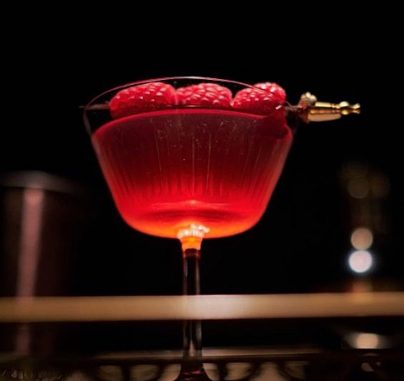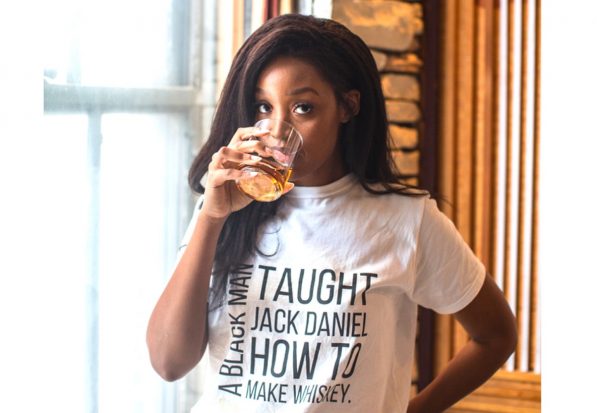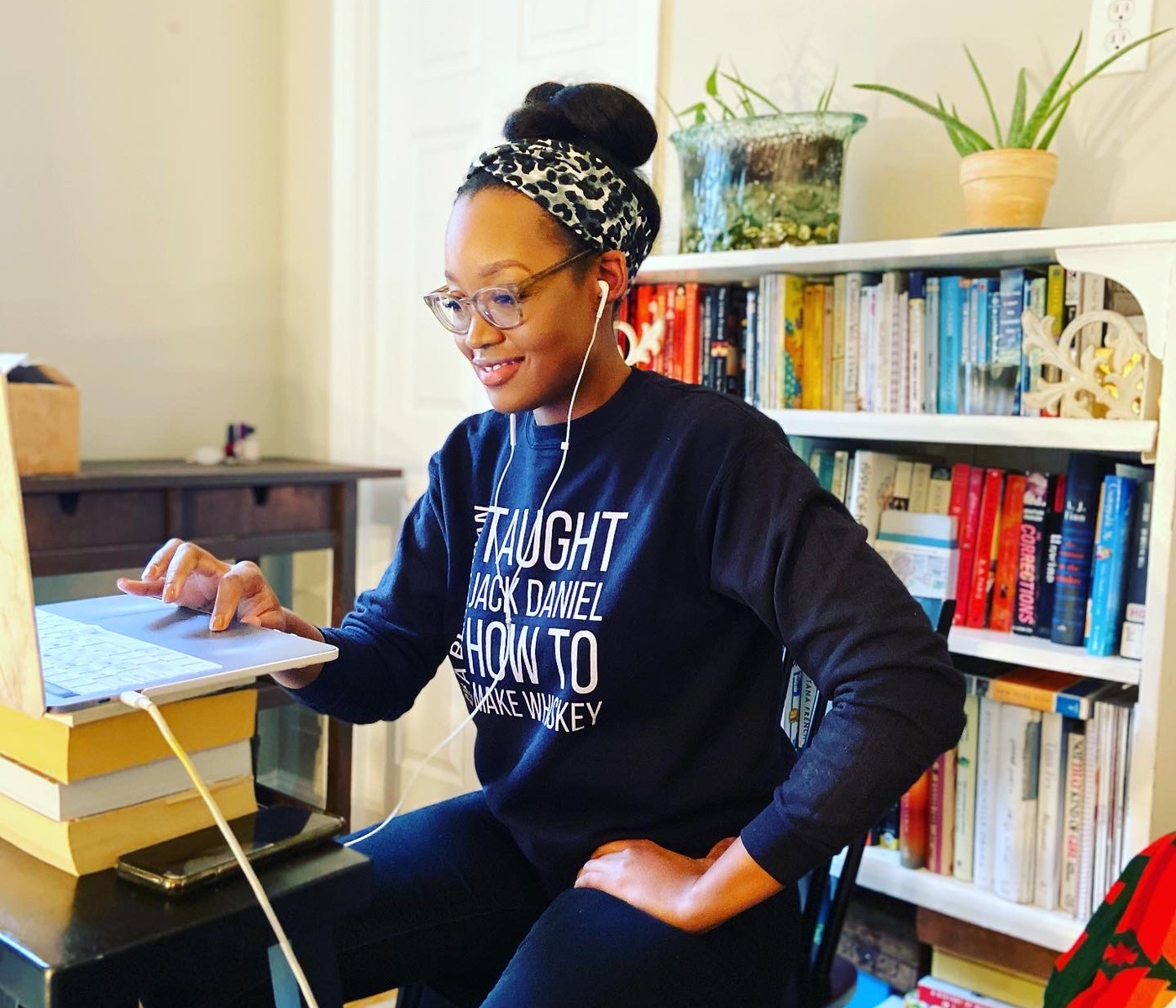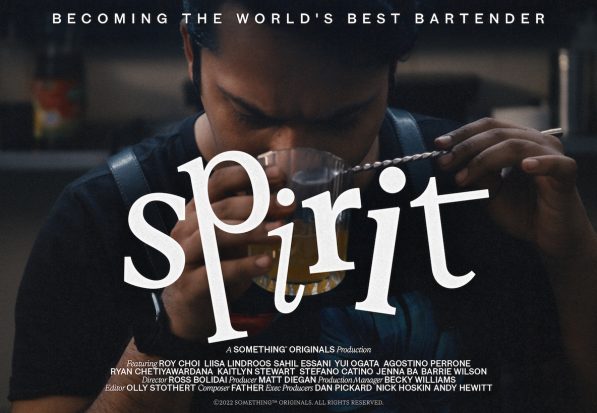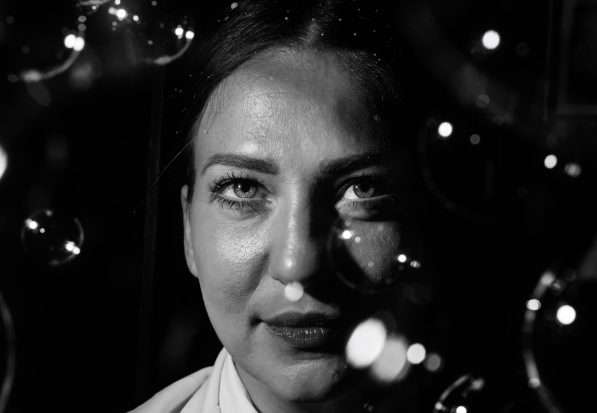Believed to be one of the largest movements in recent US history, the implications of Black Lives Matter have changed the world.
Sending shockwaves across socio-economic, cultural and racial bounds, it has left many looking at privilege and racial history in a completely new way.
One person who saw the need to highlight the stories of black America, not only from the past but also the present and the future, is LaShana Daniels.
Starting her business, Do It For The Cocktail Culture, Daniels seeks to enlighten, educate, and unify people around the tales of the bar, from bartenders to distillers and everyone in between.
We talk to Daniels about the people who made history, their libations and the inspiration it provides for the future.
For more infomation connect with Do It For the Cocktail Culture on Instagram via @forthecocktailculture
Tiff: Believed to be one of the largest movements in recent US history, the implications of Black Lives Matter have changed the world. Sending shock waves through socio-economic, cultural and racial bounds, it has left many looking at privilege and racial history in a completely new way.
One person who saw the need to highlight the stories of black America, not only from the past, but also the present and the future is LeShana Daniels. Starting her business, Do It For The Cocktail Culture, Daniels seeks to highlight, educate, and unify people around the tales of the bar from bartenders to distillers and everyone in between.
We talked to Daniels about the people who made history, their libations and the inspiration it provides for the future.
Thanks for speaking to us LeShana
LaShana: Thank you for having me
Tiff: Back in June, 2020, do you remember what it was that decided you on starting Do It For The Cocktail Culture?
LaShana: Yes, . I always to tell people Do It For The Cocktail Culture is something that I didn't have in mind. It's something that happened to me. Right after George Floyd's death, like many people all over the world, I was on social media, getting as much information as I could. Everybody was getting their news from there at the time and sharing things with one another and I saw this really awesome cocktail inspired by Marcus Garvey's black nationalist flag. He was a really amazing black pioneer from Jamaican descent who lived in Harlem and lived there in the Harlem Renaissance.
So I loved the cocktail. I thought it was so dope. And then I shared it on my personal page and my stories on Instagram. And I wasn't very active on Instagram at the time. I like barely had like maybe 400 followers at most, and the person who made the cocktails like this big guy in the drinkstagram community, and he responded and said, thank you for sharing. And we built a relationship and we were sharing information with each other. I've always loved black history. I always loved history in general. So I got back into it, especially around the time of George Floyd's death. And I was sharing it with people.
I shared it with this individual and we ended up making a cocktail inspired by a man named Jerry Lawson, and we both thought his story was very fascinating. He was a black video game engineer in the seventies, who pretty much pioneered the industry as we know it and created the first interchangeable video game console, so that nostalgic idea of cartridges, him and his team.
So it's like when I found that out, I was blown away. And so I really wanted to highlight and honor his story. Yeah. And we did that through a cocktail. And what we did was I did research on him and I shared it with Brenton, who was the person I worked with Brenton Malfoy from, @cheerstohappyhour on Instagram.
And we creatively came up with ways to tie Jerry's story into the cocktail ingredients. Like for instance, he had a video game he created called the Demolition Derby, so we named the cocktail after that, but also modeled it off of a brown Derby cocktail. Fun, things like that to help you remember the story.
I post that on my personal page, Brenton posted it on his page. It got such good feedback that I said, whoa, maybe this can be like its own page, its own concept, and that's how I started Do It For The Cocktail Culture.
Tiff: Now you're actually from a fashion background.
LaShana: Yeah.
Tiff: wouldn't you be telling the stories of fashion rather than of cocktails?
LaShana: So the funny thing about it is I went to college for fashion at FIT but I quickly realized even though I loved fashion, I wanted to be a little bit more well-rounded. I think I loved culture more than I loved fashion. So while I was in fashion school, I actually started to shift the interest that I had.
So I ended up graduating with a minor in French, a minor in art history and I was working in the hospitality industry at the time. I love different facets of culture and history and, life in a more creative sense. I love cocktails too. I like got a really great foundation working in the hospitality industry, as a way to support myself throughout school, but I fell in love with it during the time.
Tiff: Now you give yourself the title Libation Librarian, is that the way you see your role as someone who collects, organises and issues information?
LaShana: So the funny thing is somebody named me that. They named me that during an interview.. And I was like, I loved that. They were like, you can have that's yours. You can keep it. I said, okay. And then I thought about it and I was like, it really does embody what we do with our cocktales at Do It For The Cocktail Culture. The cocktails are spelled C O C K T A L E because they tell stories, they help people to also learn about mixology as well. So it's like a great hodgepodge of the idea of what we do. So I am honoured to have that title.
Tiff: Now explain exactly what it's about and what you do.
LaShana: So Do It For The Cocktail Culture, like I mentioned, started off as a way to tell black history through cocktails, but we've expanded during that time, since June of 2020 Its been something that I've been monitoring in the sense of, what are people gravitating towards? What new information and knowledge I'm learning that I can share with people that I think is interesting and maybe unsung stories.
Like for instance, I learned, in the beginning of starting Do It For The Cocktail Culture about a man named Nathan Nearest, or Uncle Nearest Greene, who pretty much taught Jack Daniels how to make Tennessee whiskey. And I never ever heard that story before in my life. And when I found that out, I was like blown away. And that's something you don't know, even though supposedly it's like common knowledge throughout history, but it's like something that's not celebrated or even spoken about. So one of the things that I did being so infatuated with this story was I created merchandise that says "A black man taught Jack Daniels how to make whiskey". And that's another way to share and celebrate these stories, whether it be from the liquor industry or black history in a fun, educational, straightforward way.
Tiff: I didn't realize those t-shirts had come from you. I assume they'd come from the brand.
LaShana: No, they're not. It's so funny. I actually interviewed Fawn Weaver back in February and she, and I have it up on my page for people who want to see it, but the first thing she said to me, she's you are the person who made those shirts? I was like, yeah, I didn't know that, like it got all the way up to her that she was like saying that people were tagging her in it. And she was like, I have nothing to do with this guys, but it's truth. And I'm like, that's how I feel about it. So it's just so fascinating and amazing. And I'm so grateful that it expanded as much as it did
Tiff: Now is Do It For The Cocktail Culture full time.
LaShana: For me, now. Yep. I'm taking a full time. I've hired people to help me I'm taking it very soon seriously,
Tiff: And as well as telling the history, you create cocktails around famous figures.
LaShana: Yeah. We do it for famous figures, like for instance, we did a cocktail for James Baldwin, Frederick Douglas. It's like historically black figures that people know from history, but we like to take the angle of sharing their story in a way that you get to know them a little bit more, or you learn something new about them.
Instead of the surface I feel, yeah. A lot of figures in black history who are the well-known ones like Martin Luther King, Malcolm X. Like we have ideas about them, but we don't dive into what made them person they are or were, we like to take that angle from it, but we also do cocktails custom cocktail creations for everyday people as well.
So I've had some of my clients say, my husband's birthday is coming up and I really want to do something special for him. And it's so hard to buy something for, so can you make a cocktail for them? And we do that too.
Tiff: How difficult is it to do that? To take information from somebody you don't really know and create something that expresses them?
LaShana: For me, it's not hard, but I could see some people might definitely think it's difficult. What I also tend to do is, I have my clients, fill out questions and s o we have a template for them and I try to gather as much information as possible because the more information I have, the more connections I can make.
For instance, I'm working on a cocktail right now for my client whose husband's birthday is coming up this month. And I learned that he was from Pennsylvania, but he also loves baseball. So like we tied in ideas of baseball, like naming the cocktail, the king of the diamond. And then I'm also learning that Pennsylvania is the chocolate capital of the U S so we incorporated some chocolate in there and that's also reflecting one of his favorite desserts, which is chocolate pie. So for me, I can get these connections and then I collaborate with people also, so sometimes we all see different connections and add it together.
Tiff: And I believe you also do some events?.
LaShana: Yeah. I created, I started doing them back in November of 2020, really cool concept that I like grown and nurtured called Cocktale Hour Experiences, spelled COC, K T a L E again.
And in those experiences they're like a mixture between mixology classes and history lessons. So what happens is in the beginning, we talk about who we're honoring a cocktail form. For instance, the last one I did was for Juneteenth. And we celebrated Juneteenth in the spirit of Juneteenth, but we also highlighted Josephine Baker.
So we did double cocktail features. It was really cool. Josephine Baker was born in June.
Tiff: I didn't know.
LaShana: We took her birthday and her spirit of celebration of freedom and tied it also where we did a Juneteenth inspired cocktail of a classic red cocktail because that's a famous dish and a red drink or red food item is consumed on Juneteenth. So we did a double cocktail feature and we started off by making the drink, having people ask the mixologist questions on why did you use that ingredient? Or can I substitute this? Or, trying to understand the creation of a cocktail.
And then once everyone has the cocktail, they went through the ingredients, so they know what's in the drink. I walked through the history inspired by the drink and then weave in the symbolism of the ingredients, so people can see how we told the story through the cocktails ingredients.
Fun things like why red foods were eaten or eaten on Juneteenth, and then also highlighting black owned brands, for instance, there's a Josephine Baker tribute brand called Safina spirits, that uses Cognac from France, and we incorporated that into the cocktail and help to tell her story and walk through that inspiration with it.
I love doing them. I come from an events background, where I worked as an event manager in LA before the pandemic. I love hosting parties and events, and I told you again, I love mixology and sometimes during those events, we even do trivia themed around the honouree or like a theme of black history, like for instance, we would do Juneteenth inspire trivia and different things like that.
Tiff: And are these are open to anyone or are these done as corporate events or business based?
LaShana: Good question. So when I first started it, it was a public event that I did for Thanksgiving, and we did a sweet potato pie cocktail, but ever since then, I was doing them as private events for corporations, galas, nonprofits. But I'm really interested in taking them again, public, and doing them virtually. So everyone in the world can participate. And then also I'm, working with a big liquor brand right now to start doing them in person since everybody's itching to get out.
Tiff: And they'd be in New York I assume.
LaShana: Right now we will start in New York. See how things go and then hopefully take it worldwide.
Tiff: Out of curiosity, why are foods and drinks red on Juneteenth.
LaShana: I love that. There's actually a lot of theories why. Juneteenth was originated in Galveston, Texas, there's some slave records of saying verbal, passed down traditions of white slave owners would try to lure black people in with like red flannel fabrics, to capture them into slavery. But then there's also ideas of certain tribes in Africa, like the Yoruba people who would do certain rituals in which they would sacrifice white animals and the contrast of the red blood from those white animals was coveted. But then there's also like a lot of different ideas of the red symbolising, the blood of the enslaved people.
But it's also a cultural thing in African culture, to make red drinks out of native fruits, like hibiscus and Cola. And that was something black people when they were enslaved were able to bring along with them throughout the middle passage. So if you actually look back through previously enslaved cultures from the colonies, there are specific red drinks, like for instance, serval, which was big in the Caribbean, Jamaica, Barbados. That's a red drink made from hibiscus flowers. That was built into the culture of the enslaved, where it was like an emblem of like home and comfort and, that's their flavours, that's their pride. So it came through the generations that way as well.
Tiff: Now, getting back to the history, how important is it for these stories to be told?
LaShana: I believe they're extremely important. I'm just putting myself back in the mindset of, yeah, back in last March and into June when Black Lives Matter protests were at their height. The response that I get from my page, and from the business in general, a lot of people don't know about the contributions black people made in society, not even just America, it's society as a whole and even just like Uncle Nearest for instance, we have contributed so much to various different industries. And personally I feel like black people don't get the recognition they deserve and that contributes to that whole racial issue that we have of like black people, not being worth saying that they need to be represented a certain way or like being diminished and police brutality, all the different things that trickle down from just basically saying that black people are not good enough in a way that, that racial understanding, the divide that has caused.
So for me I think celebrating the accomplishments of black people, helps to enlighten people about it, but I like to do it in a way that's fun, so people don't feel like they're being preached to, but feel like they're learning and want to celebrate and participate.
Tiff: Do you think understanding those stories and having them more widely distributed ... is that what you mean by the stories being able to unify?
LaShana: Absolutely. I think and this, this is my perspective on it, but I do feel that understanding our past in general, not just black history, but all history, understanding the different layers and backgrounds we've come from that helps to unify everyone.
It helps to, enlighten people on different cultures. And again, going back to the culture, I love culture, but I do think that brings open-mindedness and I think that's something that a lot of people maybe take for granted or don't realise it happens. I've, at a young age was traveling around the world and it opened my eyes up to different cultures where I was able to have more respect and appreciation for things, so I feel like this is one of those ways to do it in a fun way.
Tiff: Why do you think so many of these stories have been lost?
LaShana: I think it's a variety of reasons. I have had conversations with historians. And just talking about it from the black history perspective thinking about the struggle of black people, it helps you to understand why. For instance in America black people, and even I'm sure across the world, black people were not taught how to read and write. That was taken away from us. And so we then pivoted and said, okay we're going to do oral traditions, we're going to pass these stories down. Written ways of sharing these stories is one of the ways to make sure that they do survive better than anything else I would say, but the oral tradition still live. It's one of those things where it's if it's not written, people don't really believe it, even though black people have been saying these things for years, it's yeah. But at the same time, if the evidence isn't there, that's when the arguments happen or things fall through the cracks, people don't remember stories as well over time, so I think that's one of the reasons for sure why black history has been diminished
Tiff: Who do you believe is your audience. Is it solely people in hospitality or with a cocktail interest or does it go beyond that as well?
LaShana: Honestly, I do think it goes beyond that. I think we touch all of those different demographics though. We definitely touched the mixology liquor community, but then we also touched the people who love, the idea of mixology, like for instance, my cousin, she loves the concept of mixology even wanted to go to school to be a bartender, but she ended up never doing it, but she loves interacting. We also have people who are non-alcoholic drinkers cause we make mocktails, like for instance, that Frederick Douglas cocktail, I told you about was a mocktail, to help tell his story because he strongly believed in temperance.
I feel like the general audience, the baseline, is people who are interested in learning more about stories, black history and black culture.
Tiff: And what do you want them to take away?
LaShana: I want people, every time they come into our space, to feel included, I want them to feel that they can participate and have our conversation.
I want them to learn something new that they never even thought was a possibility. I always want people to leave with a nugget that they can share with other people and also, just have a good time.
Tiff: Were a lot of the stories are already known to you or is this as much of an education for you, as it is for your audience?
LaShana: Absolutely. I feel like I am on a learning journey. Like every one of my followers on the page. Every time I feel like I learned something new, I'm eager to share it. And even if it's some things that people may think, oh, we know, but not everybody knows. So I want to share that with people too,
Tiff: Out of all the stories that you've told, which would be your favourite.
LaShana: I honestly, I like all of them and it's even funnier because I feel like I'm always learning new things that are just super fascinating that I can't stop to think, oh, this one was just the best. I do have some stories that I think I've looked back to over and over again. And I also like to see what people like, for instance I did a post because last month was national watermelon month and I did I post about the stereotype specifically in America about black people only eat watermelon and it was attached to like racist ideas and all these horrible things. But it was really fascinating to know that it came as a reaction to black people using watermelons to help build their success. So that to me was a really cool story because watermelons within the black community has been something we shied away from because of that stereotype.
But it's like learning about how we used to empower ourselves, and it used to be something that we would celebrate. I'm like, I want to reclaim that. So every story I'm always learning and I feel like I'm growing with every story that I have, so it's not necessarily one's my favorite, they're all my favorite because I am getting better as a person, and I feel like I'm sharing that with people and they're growing as well.
Tiff: Have there been any that have truly surprised you.
LaShana: Definitely that Uncle Nearest story that was like that, that threw me out there. And then another one was, this is still up for debate in some ways, but technically I'm the first person to discover the north pole was a black man.
And I didn't know that. Yeah. So his name is Matthew Henson. This guy was so phenomenal and so fascinating. And I did a really cool cocktail inspired by his story called The Kind One, because when he and his partner, I think his name is Pearson, we're in Greenland. That's where they started before they ended up finding the North Pole.
Henson was like the skilled outdoors man. He did all of these amazing things with fur and he knew how to like control dogs and speak all these different languages. And he became friends with the Inuit people, the indigenous people in greenland, and they called him The Kind One in their language, paying homage to his sweet nature. We named the drink after him, but that's one I highly recommend people look back into but his story is amazing.
Tiff: Are you finding that people are giving you ideas and giving you stories that they know.
LaShana: Oh, yeah. People, I, and I always encourage people to share stories with me too, but I had, I've gotten people to say, oh, did you know about this? Or have you seen this? Or I was thinking about you when I heard this. So that's like the community that I want to build. And I'm so happy that is actually coming to fruition with Do It For The Cocktail Culture.
Tiff: Now, considering that history is often whitened out, shall we say? And a lot of women get lost along the way as well, how hard has it been to find the details?
LaShana: Sometimes depending on how far back I'm going with the stories, it is hard to really get full concepts of the ideas of these people in history and the contributions of black people as well as women, in the liquor industry especially. Like for instance, I learned about this really incredible woman named Birdie Brown, who was a female bootlegger in the 1920s who lived in I believe it was Minnesota. And she was known for her hooch.
That's what she would call it. And she became a very famous figure oh, I think it's in Montana. sorry. She was from Missouri, but she lived in Montana. She's got a really pretty crazy story where she ended up blowing herself up while she was making her hooch.
But, there's not much information about her, even though she's like a legend. And I've also learned, especially during prohibition, there was a lot of female bootleggers and women in the industry. But those stories get lost, especially with the times. Back then people wouldn't even search women if they suspected that they were drug mules or anything like that. So they also diminished the idea that women can do these kinds of things too, or maybe pushed it to the back burner and saying, oh, that's weird case, so it has been hard sometimes to really find all those details or really fun, interesting facts but w e do the best with what we have.
Tiff: I suppose also a lot of classic cocktail history is lost because nobody ever thought to record it, because it wasn't thought of as important enough. So I suppose in that way, things also are very difficult to find.
LaShana: Yeah, for sure. Sometimes it can be I spent a lot of time trying to dig, and I'm sure the stories are still out there somewhere, sometimes and somebody has a record of them, but it's not as popular as we would like them to be
Tiff: Talking about the present, tell me a little bit about the black owned businesses in the industry that you've come across. Have you seen a large increase in that recently.
LaShana: One of the things we love to do at Do It For The Cocktail Culture, and something that I learned on my journey as well, is about the abundance of black owned brands that exist in industry, but don't necessarily get the recognition, because there are smaller productions, and then the way the liquor industry is set up in general.
And we love to support and promote them. I will say that I feel like there is a steady increase of black owned, especially liquor brands coming about. And I think it's becoming more popularized where people are becoming more aware of their existence especially with the Buy Black movement that happened last year.
I think there has been some education and insight that, oh, there's some black owned brands. And especially with the growth of Uncle Nearest, helping to create that platform, as well as the work that they do with their initiatives that they do with Jack Daniels and on their own, of helping to uplift black owned distilleries within America.
There are all these different brands that are coming about. I think there's a steady growth and I think people are going to get more excited about getting in that space more. And I hope that those initiatives help to break those barriers so that black people want to get their liquor licenses and do it right, and hopefully be able to have lucrative businesses out of their passion for spirits.
Tiff: And where do you go from here? What do you see as the future of Do It For The Cocktail Culture?
LaShana: I have so many ideas for it. I want to do things like trips around the world. I want to have a brownstone in Harlem, that's modeled off the Harlem Renaissance and a venue space where people can enjoy our cocktails and enjoy different cultural, exciting activities.
What I see right now though, is I take it based off of what the demand is from my audience and the people who are actively involved in Do It For The Cocktail Culture, giving us that feedback, giving us that love and that encouragement. I want to see what they want and maybe those things will come out of it, but I like to take it step-by-step by, giving the people what they want.
Tiff: Now, of course, if people do want to learn a lot more about not only the history, but also you, they can reach you on Instagram, which I believe is your main platform.
LaShana: Yeah. We're working on, that's another thing, so much stuff has been happening. It's been hard for me to really get a website down. I'm still working on that, but if they want to follow us, you can head to @forthecocktailculture on Instagram.
Tiff: Excellent. Look, LaShana thank you so much for taking the time to speak with us.
LaShana: Absolutely. Thank you for having me. It's a pleasure and a privilege to be on this platform for sure.
Tiff: And love hearing your stories and looking at what you're doing. Thank you for sharing everything.
LaShana: Absolutely. Cheers everyone.
